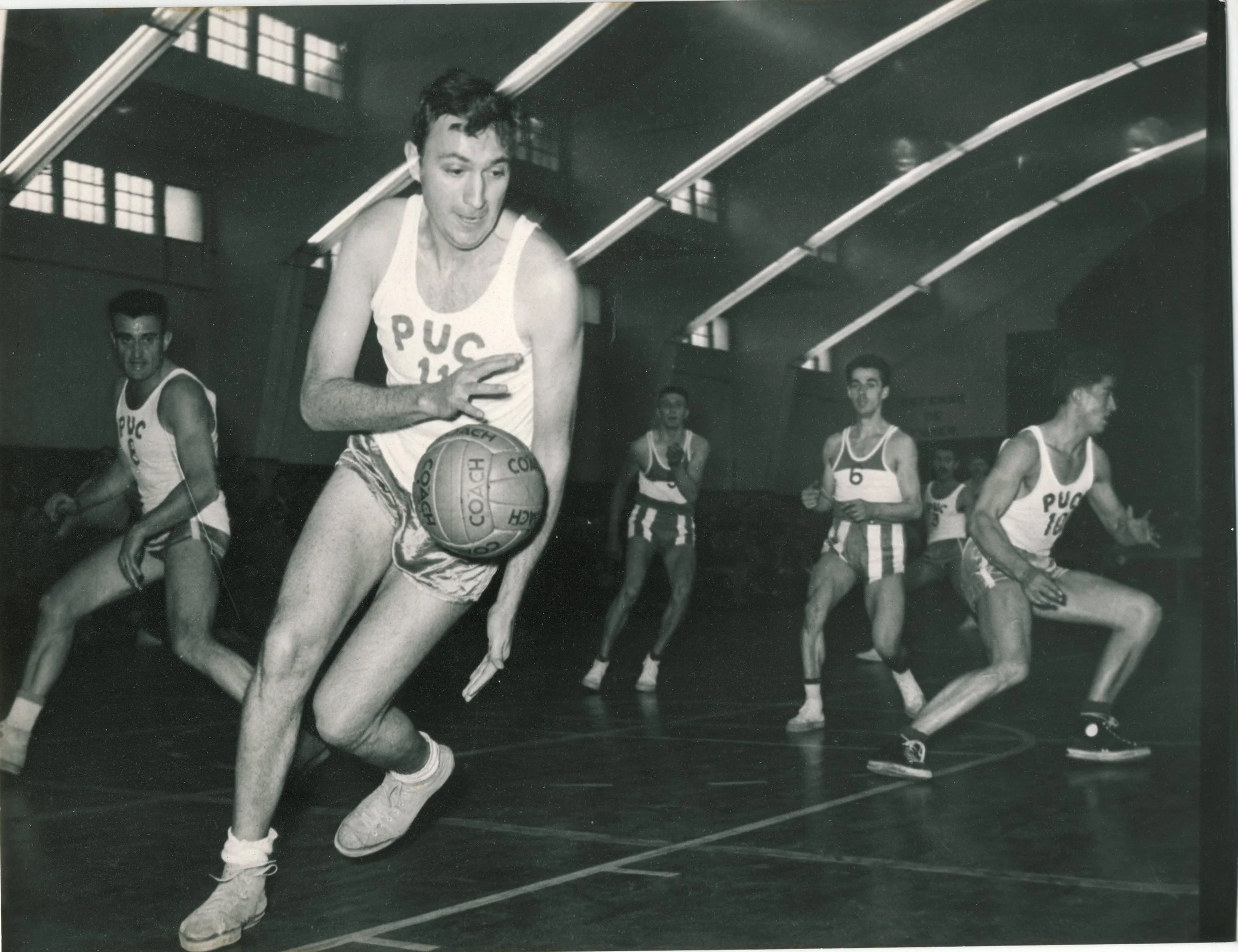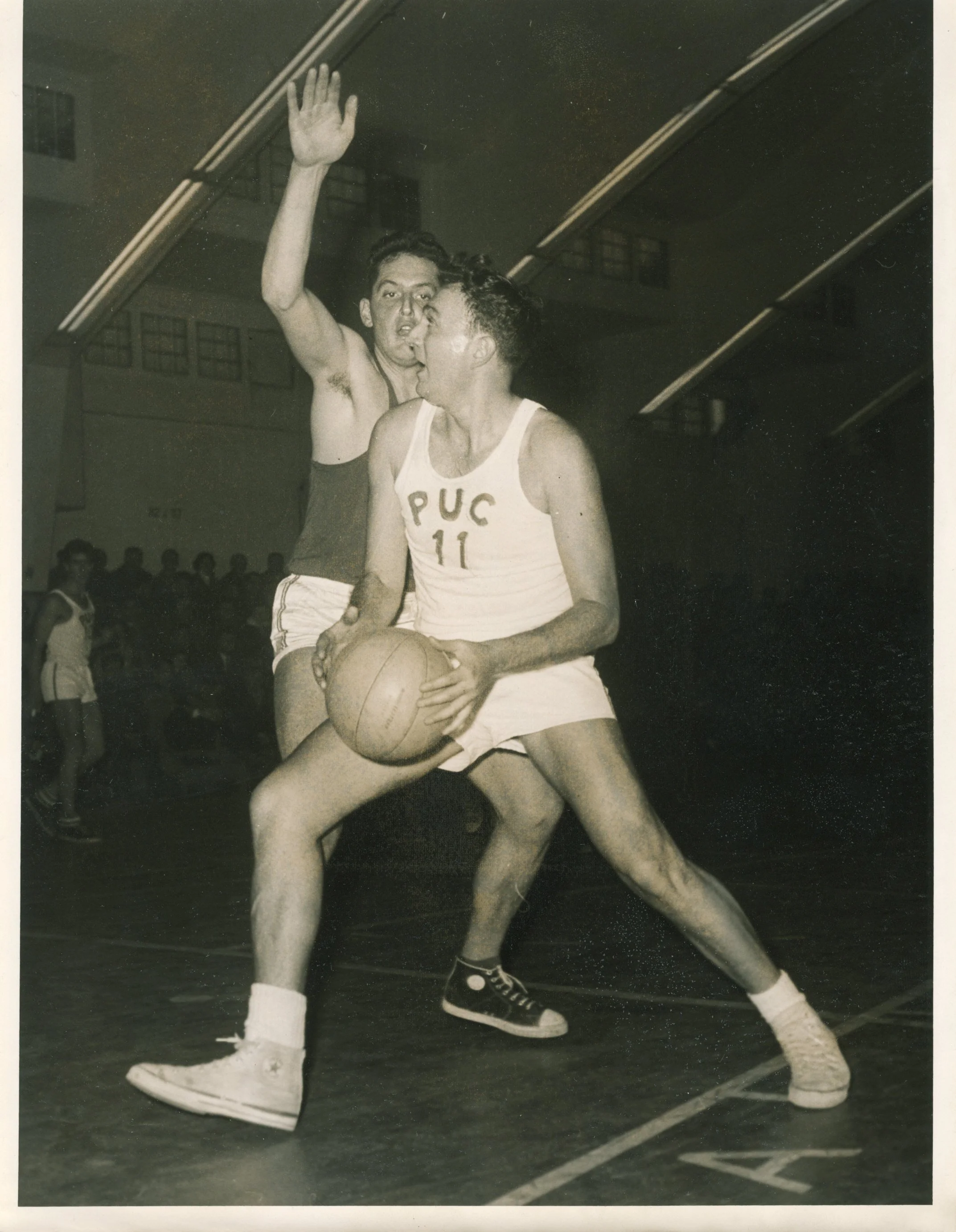🏀0️⃣1️⃣1️⃣ Martin Feinberg
Martin Feinberg. Photo: Musée du Basket.
Meet Martin Feinberg, the player and coach who was one of the first Americans to mark French basketball in the 1950s.
Born April 1926 in New York, Feinberg’s family moved to Cleveland when he was young, where he grew up playing basketball. He played the 1945-46 season at the University of Michigan, where the U.S. Navy sent him to attend officer’s school (he trained as a pilot), and after serving in the Korean War, went to Paris in 1954 to attend school thanks to his G.I. bill benefits.
Martin’s Story
Although Feinberg did not go to Paris to play basketball, the game quickly found him. Once settled in the Latin Quarter, he was persuaded to try out for Paris Université Club (PUC), one the country’s elite basketball teams at the time. Coach Émile Frézot was thrilled to have a six-foot-three American and invited the 28-year old to join the team.
Feinberg’s first game was an away match in which he scored 18 points. But the larger experience was a crash-course in the hexagone’s basketball and the culture around it. As Feinberg recalled of that introduction,
“We stopped for lunch and what do I see? These guys drinking wine! We couldn’t smoke or drink alcohol when I played basketball in the United States, and these guys were guzzling wine! I was just amazed.”
Martin Feinberg with PUC. Photo: Musée du Basket
The fan culture was very different, too. The young men who played for PUC did so alongside their university studies. Thus, their friends often filled the stands. “They had all these student songs that they sang,” Feinberg recalled. “The songs were completely anti-clerical, anti-police. But they were up for doing anything [to create atmosphere]–they did crazy things!” Whenever PUC played their inter-city rival, Racing Club de France in the Bois de Boulogne, the Bull’s Eye Orchestra played in the stands to gin up ambiance. “There was a lot going on when we played a game,” Feinberg said.
Still, the game wasn’t nearly as big as it was back home. “I didn’t see real concern about basketball being as major a sport,” Feinberg noted. That’s why he organized a trip for his teammates to the United States, the first French side to do so.
The Sports Diplomacy Connection
Martin Feinberg. Photo: Musée du Basket
Feinberg engaged in people-to-people cultural, technical, and knowledge exchange with PUC, especially through the two U.S. trips he organized for the team–what today we would call informal sports diplomacy.
The team sailed from Le Havre for New York and arrived on U.S. soil on December 28, 1955 to experience basketball’s homeland and its hoops culture. For the following two weeks they played a series of AAU and NCAA games across the Midwest, including against Wheaton College, Lake Forrest College, Marquette University, and the University of Baltimore, among others. Their record was mixed, but that was just fine for Feinberg.
“So far as I was concerned, I was trying to teach them to have a good time, enjoy themselves, see the infrastructure of basketball in the United States and meet other students. My goal was not to win…I loved the United States and wanted them to learn about basketball and Americans.”
Six years later, as PUC’s then coach, Feinberg organized a return trip to the United States. Both times, his teammates soaked in basketball culture, styles, and sneakers. They also returned with technical manuals about techniques and tactics, which they studied and deployed. Alumni of these two trips, which included Roger Antoine, Jacques Huguet, Michel Rat, and Henry “Gentleman” Fields, went on to mark French basketball in numerous ways, just one example of how cultural exchange through sports can have a lasting impact.
Mapping the Connection
From Cleveland, Ohio to Paris, France
Further Reading
[E] Lindsay Sarah Krasnoff, “The Cleveland Cabdriver’s Son Who Sowed the Seeds of a Hoops Revolution,” The Athletic, August 17, 2018.
[E] Lindsay Sarah Krasnoff, “Barnstorming Frenchmen: The Impact of Paris Université Club’s US Tours and the Individual in Sports Diplomacy,” in J Simon Rofe (ed.), Sport and Diplomacy: Games Within Games, (Manchester University Press, 2018).
[E] Lindsay Sarah Krasnoff, Basketball Empire: A Hidden Story of the (W)NBA’s Globalization (in process).
How to Cite This Entry
Krasnoff, Lindsay Sarah. “Voices: Martin Feinberg,” FranceAndUS, https://www.franceussports.com/voices/011-martin-feinberg. (date of consultation).




